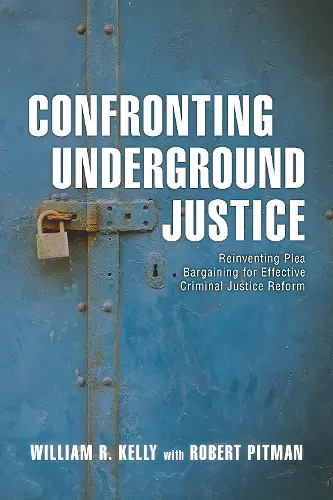Confronting Underground Justice
Reinventing Plea Bargaining for Effective Criminal Justice Reform
William R Kelly author Robert Pitman author
Format:Hardback
Publisher:Bloomsbury Publishing PLC
Published:29th Oct '18
Currently unavailable, and unfortunately no date known when it will be back

Plea negotiation is rife with due process concerns, including a heightened risk of coerced pleas, ignoring mens rea, serious questions about assistance of counsel, limited discovery and little litigation of the evidence, the conviction of innocent defendants and significant questions about fairness and equity. Plea negotiation is also the fast track to criminal conviction, tough punishment, and mass incarceration. From the perspective of public policy, plea negotiation perpetuates a harm based, retribution focused system of crime and punishment.
Because of the failures of public health, the justice system has become a dumping ground for hundreds of thousands of mentally ill, substance addicted and abusing, and neurocognitively impaired offenders. And because of a tough on crime mentality and lack of information and options, the justice system routinely prosecutes and punishes these offenders. The evidence is quite clear that punishment does nothing to improve these circumstances and often exacerbates them. The result, as one would predict, is extraordinarily high rates of reoffending, propelling the revolving door of the justice system. Confronting Underground Justice takes a close look at plea negotiation, criminal prosecution, public defense, and pretrial justice systems and identifies a wide variety of problems and concerns with each. William R. Kelly and Robert Pitman provide key decision makers with the tools to make better, more informed decisions regarding pre-trial detention, prosecution and plea deals, criminal defense, and diversion to treatment. Critical to this effort is redefining roles, responsibilities and the culture of criminal justice by prosecutors, judges and defense counsel accepting responsibility for reducing recidivism and embracing problem solving as a primary decision making strategy.
Kelly and Pitman combine decades of academic research and policy expertise, with real world experience in the court system, as a judge and prosecutor to develop innovative and comprehensive reform. Confronting Underground Justice provides a prescriptive roadmap for how to fundamentally reinvent plea negotiation, pre-trial decision making, criminal prosecution and public defense to effectively reduce recidivism and save money.
Kelly, director of the Center for Criminology and Criminal Justice Research at the University of Texas at Austin, and federal judge Pitman cogently analyze a common facet of the American criminal justice system: plea negotiations, which yield more than 95% of all criminal convictions. The prevalence of plea deals developed as a consequence of the massive uptick in arrests in the late 20th century, which made plea bargains essential to keep dockets from backing up with defendants demanding trials. As a result, some defendants pleaded guilty despite their innocence, and some did so in advance of pretrial hearings that would have determined the constitutionality of their arrest and the evidence sought to be used against them. The authors propose a number of reforms meant to address the perceived injustices of the current process, including creating a neutral plea mediator who would “serve the dual purpose of ensuring that each side had an adequate opportunity to consider the consequences of a plea as well as possible alternate outcomes.” But as thoughtful as their suggestions are, as they note at the end, the absence of “political will to make meaningful comprehensive reform a priority” makes this of more intellectual than practical utility. Still, this sobering study deserves a wide readership. * Publishers Weekly *
Confronting Underground Justice illuminates the critical role of plea bargaining in American criminal justice. Drawing on a wealth of scholarship, as well as interviews with prosecutors, judges, and public defenders, and their extensive experience with how criminal court processing occurs, Kelly and Pittman demonstrate that we face two choices – allow plea bargaining to operate like a runaway train or take control of it. As they convincingly argue, the offers the only and best chance for creating more justice and improving public safety. At once enlightening and though-provoking, this book should be on the nightstands of scholars, policymakers, and any and all who care about improving criminal justice in America. -- Daniel P. Mears, Professor of Criminology at Florida State University
Confronting Underground Justice is a must-read for those who care about criminal justice reform. Kelly and Pitman convincingly argue that reform requires a fundamental rethinking of plea bargaining and the responsibilities of prosecutors as well as dramatic changes to the pretrial system. Their recommendations are bold, and their research is backed by their considerable expertise as well as intensive analysis of interviews from a broad range of criminal justice stakeholders. -- David Kirk, Professor of Sociology, Oxford University
Confronting Underground Justice offers a practical, lucid, and compelling explanation of how a shadowy underworld of plea bargaining begets and maintains our mass incarceration epidemic. Drawing from the most recent public policy research and from interviews with major criminal justice stakeholders, Kelly and Pitman reveal how prosecutors and their plea offers control much of the criminal justice system. Kelly and Pitman propose sensible, compassionate, and sane plea bargaining reforms. This is a “must read” book for any prosecutor who wants to truly be “smart on crime.” -- Pamela R. Metzger, Professor of Law and Director, Deason Criminal Justice Reform Center, SMU Dedman School of Law
- Winner of Choice Outstanding Academic Title 2019
ISBN: 9781538106488
Dimensions: 235mm x 161mm x 25mm
Weight: 526g
260 pages